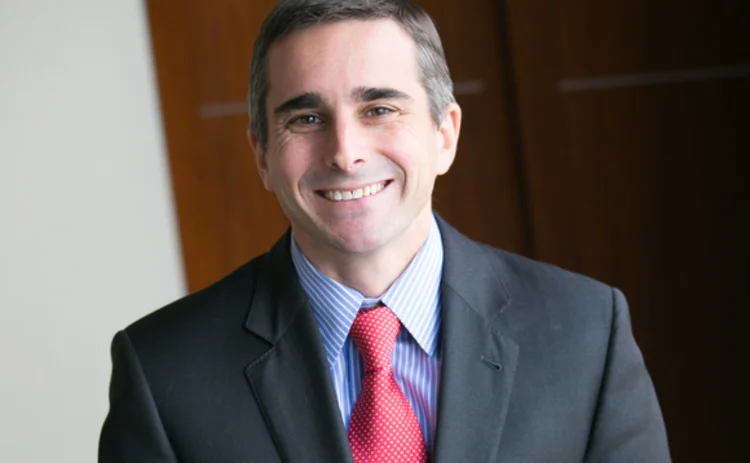Empire Builder: Blackstone CTO William Murphy

A few decades back, a police officer in Nassau County, Long Island, took on a new role in his department, joining a program to learn more about nascent computer science affecting his unit’s crime scene investigation. His house steadily filled with technology, at a time when that kind of thing was far less ubiquitous.
What appeared as a small and seemingly innocuous decision, born of curiosity, would portend long consequences for the officer’s son. One early testament, a home movie now famous among extended family, features the officer’s daughter interrupting her brother at a desktop, hard at work on a newfound hobby. “What are you doing?” she asks him. Bill Murphy, then 11 years old, answered casually, “Writing computer programs.”
Years later and now the CTO at Blackstone Group, Murphy says he’s made sure that particular videotape is buried in an attic someplace. But from that early start, the evidence remains. Everywhere Murphy’s gone, he’s found himself on the ground floor of a new challenge, grinding away. Leading a technology team of 250 to back Stephen Schwarzman’s pioneering private equity shop—its assets under management exceeding $205 billion and alternative investment strategies now extending well beyond traditional private equity—Murphy is on to another fresh cause: evolving Blackstone’s technology to match its vaunted entrepreneurship.
Taking Ownership
Bill Murphy has never shied from a risk. He left a team of 30 and $10 million budget at Boston-based Sapient, the only place he’d known since graduating from the University of Pennsylvania, to work as a founding technologist with an initial total staff of three at a then-startup called Capital IQ—now S&P’s primary financial information platform.
With Murphy doing much of the coding himself, Capital IQ’s first tech project, tellingly, was to provide private equity and venture capital information and a targeting engine to match opportunities to the right investors. As Capital IQ’s data services steadily grew, an early client, Blackstone, began to take notice of a technologist operating in an entrepreneurial mold.
“Where our design process was, we needed to back up three steps. Before, when a request would come in, IT would run around, work really hard, but not assess why the need was there to begin with. Now we can start with getting people in a room, where the first goal is simply to explain the function required in gruesome detail, so as to develop the right solution. Understanding ‘why’ is the only thing that I care about at that stage.” —Bill Murphy, Blackstone
“We were searching exhaustively for a creative and effective leader with a deep background in application development and building world-class solutions. What we liked most about Bill was not only his leadership at Capital IQ, but the fact that his ideas had disrupted the ‘terminal’ business, and made the first truly web-based data platform,” says Laurence Tosi, Blackstone’s CFO, known within the firm simply as “LT.”
Colleagues who witnessed Murphy’s early rise were initially surprised by his move to Blackstone in 2011. “Their first reaction was amazement over Blackstone’s reputation, which was very encouraging; the second was ‘Wow, that’s different,’” Murphy says. But the CTO didn’t see his new objectives as all that different. As at Capital IQ, the first would be to build a sense of ownership over tech expertise as well as technologists’ responsibilities.
Only users who have a paid subscription or are part of a corporate subscription are able to print or copy content.
To access these options, along with all other subscription benefits, please contact info@waterstechnology.com or view our subscription options here: https://subscriptions.waterstechnology.com/subscribe
You are currently unable to print this content. Please contact info@waterstechnology.com to find out more.
You are currently unable to copy this content. Please contact info@waterstechnology.com to find out more.
Copyright Infopro Digital Limited. All rights reserved.
As outlined in our terms and conditions, https://www.infopro-digital.com/terms-and-conditions/subscriptions/ (point 2.4), printing is limited to a single copy.
If you would like to purchase additional rights please email info@waterstechnology.com
Copyright Infopro Digital Limited. All rights reserved.
You may share this content using our article tools. As outlined in our terms and conditions, https://www.infopro-digital.com/terms-and-conditions/subscriptions/ (clause 2.4), an Authorised User may only make one copy of the materials for their own personal use. You must also comply with the restrictions in clause 2.5.
If you would like to purchase additional rights please email info@waterstechnology.com
More on Emerging Technologies
CompatibL’s unique AI strategy pays dividends
CompatibL’s unique approach to AI and how its research around cognitive bias and behavioral psychology have improved the reliability of its AI-based applications.
Market participants voice concerns as landmark EU AI Act deadline approaches
Come August, the EU’s AI Act will start to sink its teeth into Europe. Despite the short window, financial firms are still wondering how best to comply.
Ram AI’s quest to build an agentic multi-strat
The Swiss fund already runs an artificial intelligence model factory and a team of agentic credit analysts.
Fidelity expands open-source ambitions as attitudes and key players shift
Waters Wrap: Fidelity Investments is deepening its partnership with Finos, which Anthony says hints at wider changes in the world of tech development.
Fiber’s AI gold rush risks a connection drop
In search of AI-related profits, investors flocked to fiber cables, but there are worrying signals on the horizon.
JP Morgan gives corporates an FX blockchain boost
Kinexys digital platform speeds cross-currency, cross-entity client payments.
BlackRock further integrates Preqin, Nasdaq and Osaka Exchange partner, and more
The Waters Cooler: SGX remodels data lake, ICE seeks tokenization approval, TNS closes Radianz deal, and more.
ICE to seek tokenization approval from SEC under existing federal laws
CEO Jeff Sprecher says the new NYSE tokenization initiative is not dependent on the passage of the US Clarity Act.







